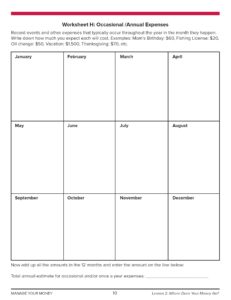Not everyone would say this, but I love teaching high school students about money. The OSU Extension program “Real Money. Real World.” is a sneak peek at managing money as an adult. It is eye-opening for these students to see how quickly our expenses add up each month. Another impressionable day is dissecting paycheck withholdings. The students watch their earnings shrink smaller and smaller with every line of federal, state and local taxes, FICA/ Social Security and Medicare, and health insurance costs.
Years ago, an individual who worked in payroll for a company shared with me that if employees were expected to pay all their income taxes in one lump sum come April 15, then almost everyone would likely come up very short. Though it is a bit painful to have these taxes deducted from our paychecks each time, this strategy offers one less thing to plan for and save for on our own.
That said, an executive memorandum recently went into effect on September 1 that allows employers to defer the withholding of the employee portion of Social Security tax. Officially this is the “Old Age, Survivors and Disability” (OASDI) portion of “Federal Insurance Contributions Act” (FICA) taxes and is a 6.2 percent tax on employee wages. This is matched by employers also at 6.2 percent for a total of 12.4 percent going toward Social Security.
At first, it was unclear how employees would know about this or whether it was an employee or employer choice to implement this tax deferral. Further clarification was provided by the IRS a couple of weeks ago and makes it pretty clear that this is an employer’s call on whether to implement this. Many employers are choosing not to defer this tax payment for a variety of reasons.
Keep in mind that deferred means putting something off until later. So though this gives a little more money in a paycheck right now, this tax still needs to be paid to the government later. That later time is between January 1 and April 30 of 2021. There have been hints that Congress could eliminate this requirement, but it is risky to make any assumptions about possible Congressional decisions six months from now. Employees do potentially miss out on a tax benefit if Congress passes legislation to forgive the deferred amounts.
Another uncertain aspect is what would happen to employers if employees do not pay their portion of the deferred tax by next spring. Ultimately, the IRS could go after the employer for that money. Add to that complicated situations like employees leaving a company or having their jobs terminated, and you can see why most employers have a longer con list than pro list.
Several large companies, including UPS, FedEx, Proctor & Gamble and more, have stated they will not implement the tax deferral. However, one very large employer is participating. Federal government agencies will implement the deferral for federal employees who meet the income qualifications, earning less than $4,000.00 biweekly.
This whole situation is a good reminder of the importance of including occasional expenses in our monthly budgets. There are plenty of expenses that only come along once, twice or a handful of times throughout the year. How are you planning for those? Remember that a monthly budget is more than just our monthly bills.
Also, it would be wise to include “what if’s” in our budgets. Depending on your family, your health insurance deductible is one of those expenses that may or may not happen. But, are you prepared(PDF) if you need to pay the full deductible amount for a year? Are you specifically allocating money into savings if you will need to pay that deductible? Or are you just hoping that everyone will stay healthy and accident-free?
Today I’ll leave you with this quote from Eleanor Roosevelt, “It takes as much energy to wish as it does to plan.”



